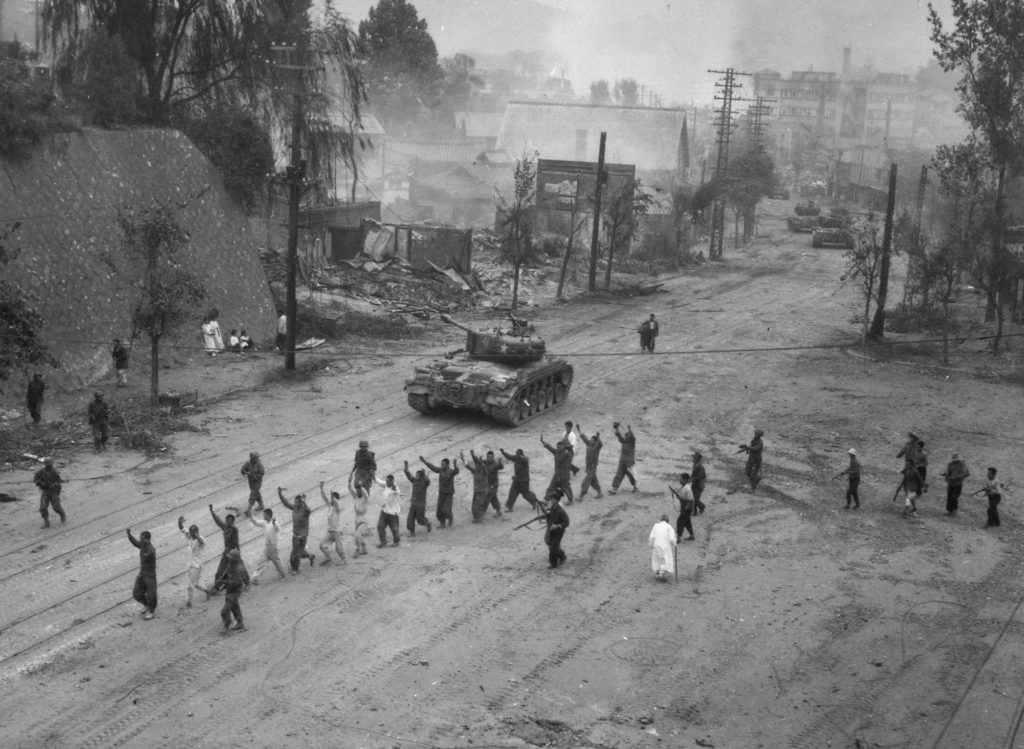The Korea Analogy
Paul’s post about David Remnick’s interview of Stephen Kotkin reminds me of another interview that Kotkin recorded in February. In that earlier interview, Kotkin draws an analogy between Putin’s decision to invade Ukraine and Stalin’s decision to give Kim Il-sung the “green light” to invade South Korea.
The comparison not only highlights the dysfunctions of personalist regimes, but the (potential) effects of the Russo-Ukraine War on U.S. foreign policy. Back in January, Gregory Mitrovich published an excellent piece about that in The Washington Post.
Though the Cold War had begun several years before the North Korean invasion, American strategic planners considered military force a deterrent and saw the true field of battle as taking place in the realm of political and economic warfare. This was true even of NATO. When it was created in 1949, American policymakers believed that a public U.S. commitment to defend Europe would alone be sufficient to prevent a Soviet attack. The United States possessed a monopoly on the atomic bomb, and even more important, a vast economy that had repeatedly demonstrated its ability to outproduce its wartime rivals. As George Kennan argued in 1948, “the events of the past two wars have demonstrated that unless a European aggressor can be sure of dealing a decisive blow to the North American military-industrial potential in the initial phase of his effort to dominate the European continent, he can never be sure of final victory.”
At the time of the invasion, officials in the Truman administration strongly disagreed about whether to pursue the more muscular, aggressive version of containment envisioned in NSC-68. Influential Republicans, most notably Robert Taft, were skeptical of the new “entangling relations” created by the Rio Pact (1947) and the North Atlantic Treaty (1949).
The Korean Crisis, and especially Chinese intervention in October of 1950, changed the terms of the debate.
Stalin and Kim badly misjudged U.S. resolve as well as the Truman administration’s desire to demonstrate to its new European allies its will to fight against Soviet or Soviet-inspired military aggression. Instead of a three-day march on Seoul, the invasion sparked a three-year war that devastated the Korean Peninsula, resulting in millions of casualties, including 150,000 Americans. The United States eventually deployed more than 350,000 troops and launched a relentless bombing campaign against the advancing North Korean — and later Chinese — armies, including the use of “firebombs” that would incinerate much of the peninsula. The Truman administration also exploited the Soviet boycott of the United Nations (to protest the refusal of the Security Council to seat a representative from the new communist government in China) to gain council approval for its military intervention.
The war led to a manifold increase in defense spending as the U.S. defense budget surpassed 15 percent of GDP, and the deployment of hundreds of thousands of American troops to Europe as the core of a powerful NATO army backed by a rapidly increasing nuclear stockpile, crystallizing a global military confrontation that would last for the next four decades.
Or, as Rebecca Lissner puts it in her dissertation (now a book):
The Korean War changed the conversation… convincing policymakers… that the Soviet threat was immediate enough to warrant massive increases in defense expenditures. The danger of Communist conquest of Europe and inroads… in Asia prompted changes in U.S. foreign policy and defense posture with implications that remain decisive…. [Korea] prompted the United States to increase aid to Indochina and the Philippines, deploy the Seventh Fleet in the Taiwan Strait to protect the Nationalist government, institutionalize NATO’s military structure, push for German rearmament, and finance an unprecedented increase in defense spending to fund the military buildup necessitated by these efforts…. “It was this war and not World War II that occasioned the enormous foreign military base structure and the domestic military-industrial complex to service it and which has come to define the sinews of American global power ever since.”
As many international-relations scholars argue, war generates information, particularly about relative military capabilities. It’s one thing to have big defense budgets and shiny equipment. It’s another to prevail on the battlefield.
Consider that just weeks ago a lot of us thought that Russia had successfully modernized its forces. The current conflict suggests we overestimated Russian military capabilities.
For Lissner, “wars of revelation” – Korea, and later Vietnam and the Gulf War – produce significant “adjustments” in U.S. grand strategy. Korea not only demonstrated (at least to policymakers) that the U.S. needed a stronger military, it also drove home both the value of alliances and the willingness of Communist countries to mount wars of aggression.
The Russo-Ukraine War looks to have already produced major shifts in European thinking about defense policy, but it’s too early to predict precisely how it will affect U.S. foreign and security policy. One big reason: the possible return of Trump — or another reactionary populist — to the presidency.
In fact, so long as reactionary populists remain 1) a major faction in the Republican party and 2) enamored of Putin and Putinism then any national election could upend U.S. strategic priorities.
The Kremlin knows this; we should expect that its next round of efforts to meddle in U.S. elections will dwarf those seen in past cycles. The Russian government would love for the U.S. to experience another, and even more dangerous, post-election insurrection. The Kremlin has plenty of tools to facilitate that, including trying to mess with U.S. election infrastructure.
But perhaps Donald Trump and Tucker Carlson will suffer the same fate as their isolationist forebears. Or perhaps high-ranking officials like McConnell will treat election meddling as a genuine threat to national security. If past is prologue, I wouldn’t hold my breath.



